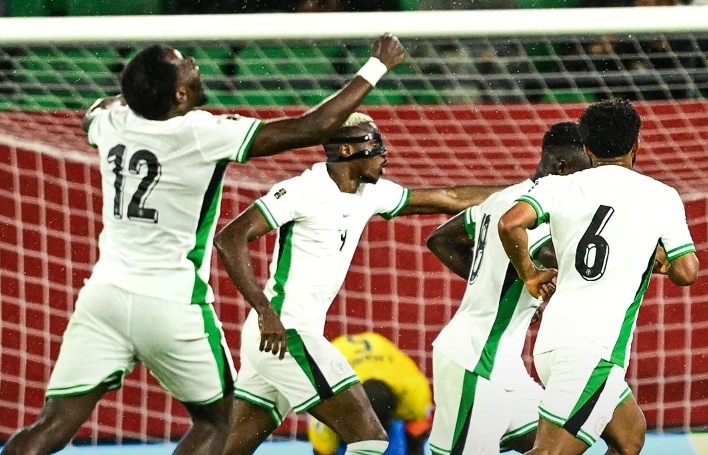Nigeria produced a stunning 4-1 extra-time victory over Gabon on Thursday to overcome the first of three hurdles on the road to qualifying for the 2026 World Cup, Footynaija.com reports.
The Super Eagles, bruised by inconsistency in recent months, showed flashes of old swagger mixed with tactical maturity.
But beyond the goals, drama, and Osimhen’s trademark energy, this game revealed deeper lessons about Nigeria’s footballing future. Here are five key takeaways from a night that began in tension and ended in triumph.
Nigeria move one step closer to the #FIFAWorldCup 26 Play-Off Tournament!#WeAre26 pic.twitter.com/MdlYNUep5I
— FIFA World Cup (@FIFAWorldCup) November 13, 2025
1. Benjamin Fredrick is the real deal
If anyone needed proof that Benjamin Fredrick is the future of Nigeria’s defence, this was it.
The 20-year-old was handed a huge responsibility as coach Eric Chelle benched captain William Troost-Ekong, and Fredrick repaid that trust in style.
Guess who???
Say something about this boy. pic.twitter.com/UQ3jAfKo70
— Adepoju Tobi Samuel (@OgaNlaMedia) November 13, 2025
Tasked with containing Gabon’s talisman Pierre-Emerick Aubameyang, the teenager put on a clinic in timing, strength, and positioning.
He kept the veteran striker unusually quiet, winning six aerial duels and completing 91% of his passes. What’s more impressive was his composure under pressure, not once did he look flustered.
And it wasn’t just about defending. Fredrick showed awareness beyond his years when he initiated the move that led to Osimhen’s first goal. That forward thrust, blending confidence and intelligence, underlined why he’s already attracting interest from Europe’s top clubs. For Nigeria, the message is clear: the future has arrived.
2. Chelle’s switch to 4-3-3 changed everything
Eric Chelle started with a 4-4-2, pairing Osimhen and Akor Adams up front. It looked exciting on paper but flat on the pitch. Nigeria’s midfield was stretched thin, and Gabon’s counterattacks repeatedly exploited the spaces left by Iwobi and Ndidi.
Nigeria are through to the African #WCQ Play-Offs Final! pic.twitter.com/3T50VtVWt2
— CAF_Online (@CAF_Online) November 13, 2025
At 1-0, with with the game seemingly won, Chelle made the bold call, removing Adams and bringing in Brentford’s Frank Onyeka to form a 4-3-3. But Gabon equalised and forced the encounter into extra time. But that unplanned tactical week proved to be the difference in the ensuing thirty minutes.
The difference was night and day. Suddenly, Nigeria looked balanced, more compact, and better structured.
Onyeka’s presence allowed Iwobi to push forward creatively, while Ndidi’s interceptions increased. The result? Nigeria scored three goals in 30 minutes. It was a tactical improvisation rewarded handsomely, and a reminder that Chelle may need to be more flexible with his team strategy going forward.
3. Victor Osimhen: unpredictable but unstoppable
If ever there was a player who embodies controlled chaos, it’s Victor Osimhen. For much of the match, he was maddening; missing open chances, misjudging runs, and gesturing in frustration. But once the switch flipped, he became a force of nature.
It’s always Victor Osimhen for Nigeria ❤️ pic.twitter.com/vGGwmXSAFM
— Ligue 1 English (@Ligue1_ENG) November 13, 2025
His two extra-time goals were a study in persistence and power. The first was a striker’s finish after Fredrick’s smart buildup. The second, pure Osimhen — chest control, raw pace, and a thunderous strike that left the Gabon defence in ruins.
That brace took his international tally to 31 goals, inching him closer to Rashidi Yekini’s long-standing record. For all his unpredictability, Osimhen’s relentlessness makes him Nigeria’s most valuable asset, a player who can turn wastefulness into wonder in a blink.
4. Chidera Ejuke’s rebirth in green and white
Chidera Ejuke’s international career has often felt like a song interrupted; flashes of skill, then long absences. Against Gabon, he finally delivered a full chorus. Introduced in the second half, the Sevilla winger injected pace and purpose, and his well-taken goal in extra time was richly deserved.
— Sevilla FC (@SevillaFC_ENG) November 13, 2025
Ejuke’s movement down the flank created headaches for Gabon’s tired defenders, and his link-up with Osimhen hinted at a partnership worth developing. If he can maintain this form, Nigeria might finally have the wide-right attacker they’ve been searching for since the days of Victor Moses.
5. Nigeria’s resilience is back
For a team that’s been criticised for losing focus late in games, Nigeria’s response to Gabon’s 89th-minute equaliser was refreshing. Instead of collapsing, they regrouped, dominated extra time, and hit the Panthers with precision and purpose.
The mental strength on display, from Fredrick composed execution to Ndidi’s tireless engine, spoke volumes about Chelle’s growing influence.
The Super Eagles looked like a team rediscovering their bite and belief.
As they head toward the playoff final, this victory could be a turning point. Nigeria, once again, look like a side capable of soaring.

























